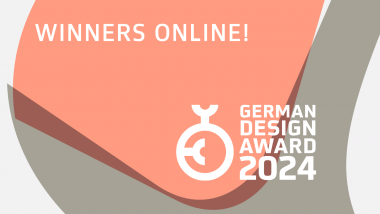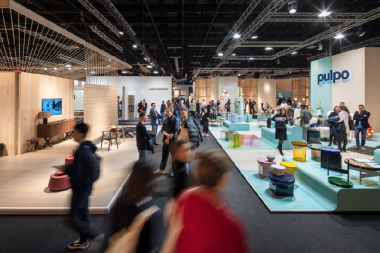German Design Award 2024: Rat für Formgebung gibt Gewinner*innen bekannt
Die internationale Jury hat gewählt: Insgesamt 65-mal wurde die Auszeichnung „Gold“ in den Disziplinen „Excellent Product Design“, „Excellent Communications Design“ und „Excellent Architecture“ beim German Design Award 2024 vergeben. Alle Gewinner*innen werden im Rahmen der Award Show am 26. Januar 2024 in Frankfurt am Main geehrt. Zu diesem Anlass wird auch bekannt gegeben, wer die Auszeichnung „German Design Award Newcomer“ gewinnt. Mit dem German Design Award prämiert der Rat für Formgebung Gestaltungstrends sowie innovative Designleistungen, die alle Bereiche des täglichen Lebens und die Vielfalt der Designkultur abdecken.
Innovative Produkte, nachhaltige Lösungen und State-of-the-Art im Design – der German Design Award geht an Unternehmen, deren Produkte und Projekte in den drei Award-Disziplinen „Excellent Product Design“, „Excellent Communications Design“ und „Excellent Architecture“ überzeugen. Auszeichnungen wurden in diesem Jahr an 55 Nationen in 68 Kategorien vergeben, neben „Winner“ und „Special Mention“ insgesamt 65-mal über alle Disziplinen hinweg die höchste Auszeichnung „Gold“. Immer stärker im Fokus stehen dabei Transformationsthemen: Wie können Produkte umweltfreundlicher gestaltet, Nutzungserlebnisse optimiert, Prozesse effizienter und unsere Lebenswelt gerechter werden?
Unter den Auszeichnungen in der Disziplin „Excellent Communications Design“ sind in diesem Jahr insbesondere die Kategorie „Brand Identity“, „Corporate Identy“ sowie „Event“ stark vertreten. In „Excellent Product Design“ haben die Kategorien „Medical/Health Care“ und „Sports/Outdoor Activities“ herausragende Einreichungen zu verzeichnen. Daneben stechen diejenigen Kategorien hervor, die sich um die Gestaltung des Zuhauses drehen – von „Outdoor Living“ hin zu „Furniture“ und „Kitchen“ über „Bath & Wellness“. Dieser Trend setzt sich in der Disziplin „Excellent Architecture“ fort: Neben Architekturprojekten ist es die Kategorie „Interior Architecture“, die die meisten Auszeichnungen hervorgebracht hat.
Eine vollständige Übersicht über aller Gewinner*innen und Kategorien erhalten Sie zum Download hier.
Rat für Formgebung - German Design Council
















